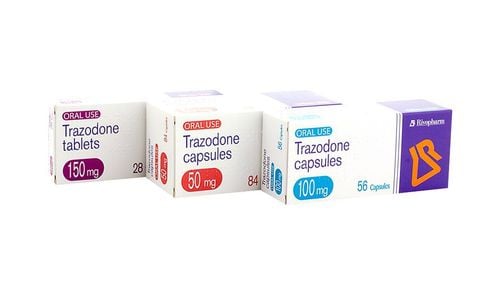This is an automatically translated article.
Amytal sodium is a sedative that induces sleep. Usually used in the short-term treatment of insomnia and before surgery. Let's find out the uses and things to note when using Amytal sodium in the following article.
1. Amytal sodium is what drug?
What is Amytal sodium? The drug amytal sodium has the main ingredient amorbarbital sodium, which is prepared in the form of injections.
Amytal sodium is a barbiturate drug. Barbiturates are non-selective central nervous system depressants, mainly used as sedative hypnotics. In low doses they are also used as anticonvulsants.
2. Uses of Amytal Sodium
Amytal sodium is a barbiturate drug that is capable of producing altered levels of the central nervous system, from excitability to mild sedation, hypnosis and deep coma. Overdosage can be fatal, and if therapeutic doses are high enough, barbiturates cause anesthesia. Uses of the drug Amytal sodium has the following clinical features:
Sedative effect: The drug is used in cases of insomnia. Sedatives inhibit the cerebral cortex, reduce motor activity, change cerebellar function and cause drowsiness, sedation and hypnosis. Barbiturate-induced sleep is different from physiological sleep. Studies have found that after abrupt discontinuation of regular barbiturate use, patients may experience nightmares, nightmares, and possibly a marked increase in insomnia. Therefore, discontinuation should be done gradually. All barbiturates exhibit anticonvulsant activity at anesthetic doses. Of the drugs in this class, however, only drugs such as phenobarbital, mephobarbital, and metharbital are as effective as oral anticonvulsants at low doses, used to combat seizures. Barbiturates cause respiratory depression and the degree of respiratory depression is dose-dependent. With doses used for anesthesia, the respiratory depression produced by the drug is similar to that occurring during physiological sleep and is accompanied by a slight decrease in blood pressure and heart rate.
3. Indications and contraindications of the drug Amytal Sodium
Thanks to the clinical characteristics of the drug, Amytal sodium is indicated for use in the following cases:
Used for short-term treatment of insomnia. This sedative should only be used short-term, as it appears to lose its sedating and sleep-retaining effects after 2 weeks. Take a sedative before surgery to reduce anxiety. Contraindications:
Amytal sodium is contraindicated in patients with a history of hypersensitivity to barbiturates. Do not use in patients with a history of manifest or underlying porphyria. Do not use in patients with markedly impaired liver function or respiratory disease presenting with dyspnea or airway obstruction.
4. Usage and dosage of Amytal Sodium
4.1 How to use Amytal sodium is administered by intramuscular or intravenous injection. For intramuscular injection should be injected deep into the large muscle. Intravenous administration is only used when other routes of injection are not feasible.
4.2 Dosage The dose of amobarbital sodium should be individualized for each individual patient. Factors to consider in choosing the right dose are the age, weight, and condition of the patient.
Dosage for intramuscular injection: The average dose is from 65 mg to 0.5 g. After intramuscular injection of a hypnotic dose, the patient's vital signs should be monitored. Saving intramuscular or subcutaneous injections can be painful and may produce sterile abscesses or tumors. Intravenous (IV): A slow intravenous injection is essential, after which the patient should be carefully observed during administration. The intravenous rate for adults should not exceed 50 mg/min to avoid sedation or sudden respiratory depression. The intravenous dose for sedation is 30 mg to 50 mg administered 2 or 3 times daily; The dose to induce sleep is 65mg to 200mg at bedtime. Elderly: Dosage should be reduced in the elderly or debilitated as these patients may be more sensitive to sedation.
Renal and hepatic impairment: Dosage should be reduced in patients with impaired renal function or liver disease.
Children 6 to 12 years: Dosage can be from 65mg to 0.5g can be given to children 6 to 12 years old.
Children under 6 years old: There are no studies on the safety of the drug for this population.
4.3 Overdose The toxic dose of barbiturates varies considerably from subject to subject. At a dose of 1g most barbiturates cause serious poisoning in adults. Adverse events and death have occurred following overdose of amobarbital sodium alone and in combination with other CNS depressants. Death usually occurs after doses of 2 to 10 g of barbiturates.
Symptoms of overdose may occur immediately or within 15 minutes, beginning with CNS depression, unresponsiveness or sluggish reflexes, decreased ventilation function, hypotension and hypothermia and can progress to pulmonary edema and death.
Treatment: in case of overdose, the patient should be ensured breathing, infusion, gastric lavage. Monitor vital signs and treat according to symptoms.
5. Amytal sodium side effects
During the use of Amytal sodium, patients may experience some of the following side effects:
The most common reaction that may occur is drowsiness, drowsiness during the day. Common side effects: Agitation, confusion, hyperactivity, ataxia, CNS depression, nightmares, anxiety, psychosis, insomnia, anxiety, hallucinations , dizziness, unusual thoughts; Hypoventilation, apnea; bradycardia, low blood pressure; Nausea and vomiting, constipation; fainting may occur. Other adverse reactions: Headache, injection site reactions, hypersensitivity (angioedema, skin rash, exfoliative dermatitis), fever, decreased liver function. Drug dependence:
Sedatives can make you habit-form. Drug intolerance, psychological dependence, and physical dependence can occur, especially after prolonged high-dose sedation. Symptoms of barbiturate withdrawal can be severe and possibly fatal. Signs of withdrawal that appear after stopping the drug include anxiety, tremors in the hands and fingers, muscle twitching, weakness, dizziness, visual changes, nausea, vomiting, insomnia, and orthostatic hypotension. Treatment of dependence involves judicious use of the drug and gradual discontinuation. A detox regimen may be required, on a case-by-case basis. Tell your doctor any signs of anxiety during and after stopping the medication. If serious symptoms occur, the patient should be taken to a medical facility immediately.
6. Notes when using Amytal sodium
Do not use for a long time and high doses: abuse of the drug can lead to dependence on the drug. Patients who are dependent on the drug may need to increase the dose, because the drug is reduced tolerability, which can cause life-threatening poisoning. This medicine should only be used short-term. When stopping the drug absolutely do not stop suddenly, as this can cause death. Use with caution in patients with acute or chronic pain: When used in patients with acute or chronic pain, caution should be exercised because it may cause euphoria, increased pain sensation or significant symptoms may occur. covered. Use for pregnant women: When using sedative drugs can cause fetal harm when used for pregnant women. Barbiturates readily cross the placental barrier and are distributed throughout fetal tissues, retrospective studies have shown that withdrawal symptoms also occur in neonates born to women receiving the drug. sedation during the third trimester of pregnancy. Therefore, this drug should not be used by pregnant women. Lactation: The drug should not be used unless necessary and should not be breast-feeding while taking the drug. Amytal sodium should be used with caution in patients with depression, suicidal ideation, or a history of drug abuse, with elderly or debilitated patients who may react to barbiturates with marked euphoria, depression, or confusion. Patients with liver damage should use low doses and use caution. Do not drink alcohol while taking sedative drugs. Concomitant use may result in additional CNS depressant effects. Drug interactions: Some drugs can affect when used with Amytal sodium such as anticoagulants, corticosteroids; Griseofulvin; Doxycycline; Phenytoin, Valproic Acid; Monoamine Oxidase Inhibitors (MAOIs); Central nervous system depression drugs... Drugs can cause interactions when used together, so before taking the drug you should inform your doctor about the drugs you are using. The above is the information about the drug Amytal sodium, you must not arbitrarily use or take high doses of this drug for a long time. Accordingly, use only when prescribed by a doctor or pharmacist.
Follow Vinmec International General Hospital website to get more health, nutrition and beauty information to protect the health of yourself and your loved ones in your family.
Please dial HOTLINE for more information or register for an appointment HERE. Download MyVinmec app to make appointments faster and to manage your bookings easily.
References: drugs.com, /holevn.org













